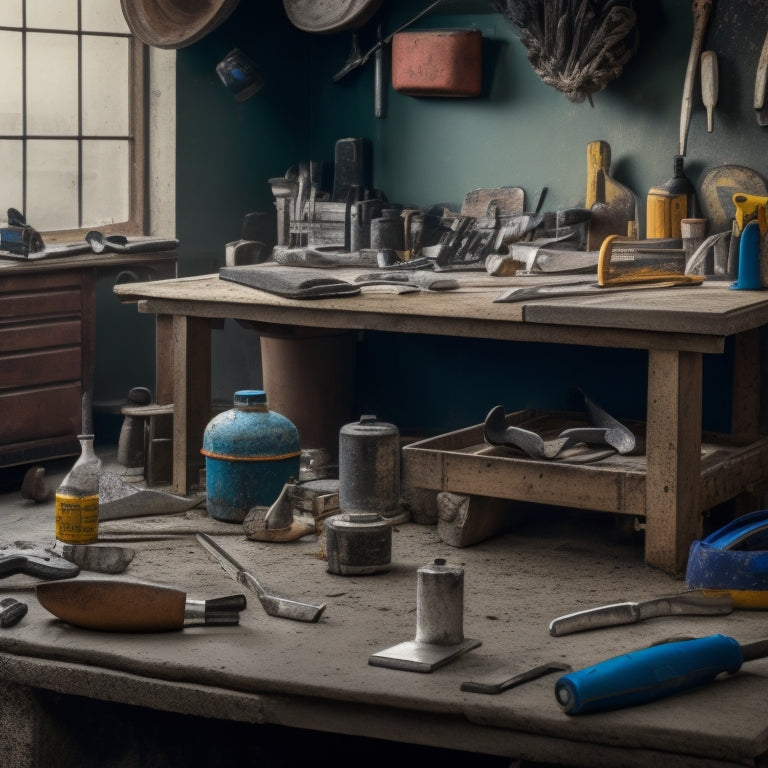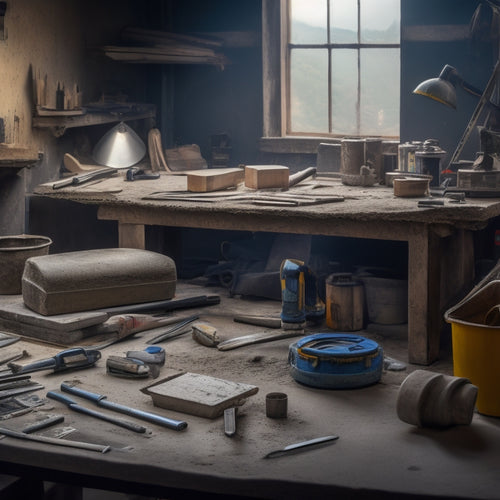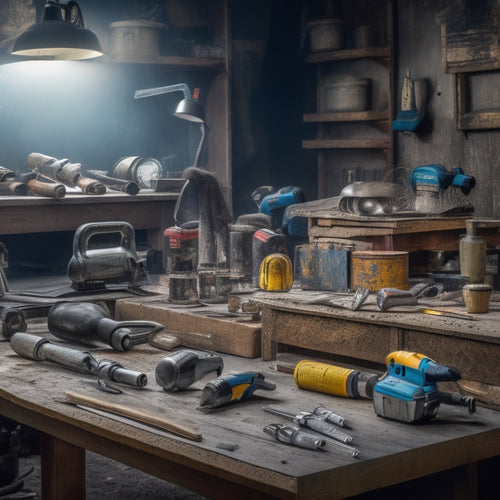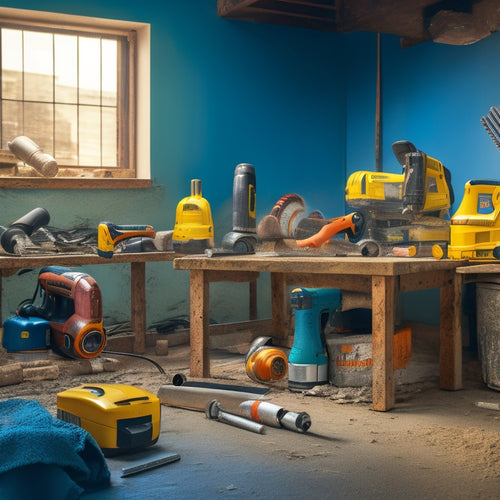
Why Start With These Concrete Repair Tools First
Share
When you're starting a concrete repair project, it's vital to begin with the right tools and techniques to guarantee a solid foundation. You'll need a hammer, chisel set, trowel, and wire brush to tackle basic demolition and removal tasks. A cordless drill is also essential for mixing, drilling, and driving. Having these must-have tools in your basic concrete repair toolbox will help you prepare surfaces, mix and apply new concrete, and maintain tool longevity. By starting with these fundamental essentials, you'll set yourself up for success and be ready to tackle more advanced repairs and techniques, and discover the best approach for your specific project.
Key Takeaways
• Essential tools like hammers, chisels, and trowels are must-haves for demolishing old concrete and preparing surfaces for repair.
• Basic tools are versatile and can be used for various tasks, making them a cost-effective starting point for concrete repair projects.
• Starting with basic tools helps identify the extent of damage, allowing for a more accurate assessment of the repair needed.
• Using basic tools first prevents over-investing in specialized equipment that may not be necessary for the project.
• Mastering basic tools and techniques builds a solid foundation for more complex repairs and increases the chances of a successful outcome.
Must-Have Tools for Beginners
You'll need a solid foundation of essential tools to get started with concrete repair, and these must-haves will help you tackle basic tasks with confidence.
As a beginner, it's easy to fall into common pitfalls, but having the right tools will save you from making rookie mistakes. A cordless drill, for instance, is a versatile powerhouse that'll help you mix, drill, and drive with ease.
Don't forget a reliable hammer, chisel set, and trowel for more hands-on tasks.
Proper tool maintenance is vital to extending the lifespan of your equipment. Regularly clean and lubricate your tools to prevent rust and corrosion.
It's also essential to store them in a dry, organized space to avoid damage. By doing so, you'll avoid beginner mistakes like using dull or rusty tools, which can lead to subpar results and safety hazards.
With these must-have tools and a maintenance routine in place, you'll be well on your way to tackling concrete repair projects with precision and confidence.
Essential Floor Repair Equipment
When tackling floor repair projects, having the right equipment is essential, and a floor scraper is a must-have for efficiently removing old adhesive, adhesives, or damaged flooring materials. This tool helps you avoid damaging the underlying surface, guaranteeing a smooth and even repair process.
To take your floor repair techniques to the next level, you'll need these essential tools:
-
Floor grinder: for surface preparation and grinding down uneven surfaces
-
Dustless vacuum: for efficient cleanup and minimizing debris
-
Floor edger: for precision cutting and shaping around edges and corners
- Moisture meter: for detecting and measuring moisture levels in the floor
These tools will help you achieve a professional-grade finish and guarantee a successful repair.
Basic Concrete Repair Toolbox
As you assemble your basic concrete repair toolbox, you'll need to focus on three essential categories: essential hand tools, concrete mixing essentials, and basic safety gear.
You'll use these fundamental items to tackle a wide range of repair tasks, from minor crack filling to major structural restoration.
Essential Hand Tools
Five fundamental hand tools form the backbone of a basic concrete repair toolbox, and having them within easy reach guarantees that you're well-equipped to tackle most repair tasks. These tools will help you prepare surfaces, apply repair materials, and finish the job with precision.
Here are the essential hand tools you should have:
-
A sturdy hammer for breaking up damaged concrete and tapping in new materials.
-
A putty knife for scraping away old adhesive, applying new sealants, and smoothing out surfaces.
-
A trowel for applying and leveling concrete repair compounds.
- A wire brush for cleaning and roughening surfaces to ensure a strong bond.
Concrete Mixing Essentials
You'll need a solid foundation in concrete mixing to produce high-quality repairs, so having the right tools and materials on hand is imperative. This includes a mixing bucket, trowel, and mixing stick.
Invest in a high-quality mixing bucket that can withstand heavy use and harsh materials. A sturdy trowel is essential for scraping the sides and bottom of the bucket, guaranteeing all ingredients are well incorporated. A mixing stick with a comfortable grip will help you maintain control and endurance during the mixing process.
Mastering various mixing techniques is also significant. You'll want to develop a consistent routine for adding ingredients, mixing, and scraping the sides of the bucket. This guarantees a uniform consistency and prevents weak spots in the concrete.
Using quality materials is critical, as they directly impact the final product's strength and durability. Choose a high-strength concrete mix specifically designed for repairs, and follow the manufacturer's instructions for the best results.
Basic Safety Gear
Your basic concrete repair toolbox should include essential safety gear, such as gloves, safety glasses, and a dust mask, to protect yourself from harsh chemicals and flying debris. This isn't just a precautionary measure, but a necessity to comply with safety regulations. By investing in protective equipment, you guarantee a safe working environment and prevent potential injuries.
Here are some must-haves for your basic safety gear:
-
Gloves: Latex or nitrile gloves to protect your hands from harsh chemicals and abrasion
-
Safety glasses: Impact-resistant glasses to shield your eyes from flying debris and chemical splashes
-
Dust mask: A respirator mask to filter out dust and particles when working with concrete
- Steel-toed boots: Protective footwear to prevent foot injuries from heavy objects or tools
Critical Tools for Successful Repair
When tackling a concrete repair project, having the right tools at your disposal is vital. A thorough toolkit should include a hammer, chisel, and trowel, among other essentials. These important tools will enable you to execute various repair techniques, such as breaking up damaged concrete, removing debris, and applying new materials.
A hammer is perfect for demolishing old concrete, while a chisel helps to remove existing finishes or damaged areas. A trowel, on the other hand, is ideal for applying and smoothing out new concrete.
Proper tool maintenance is also essential to guarantee the longevity of your equipment and the success of your project. Regularly clean and inspect your tools to prevent rust and damage. Additionally, store them in a dry place to prevent corrosion.
Flooring Project Starter Kit
A flooring project starter kit provides an exhaustive set of tools and materials specifically designed to help you tackle common concrete flooring repairs and get your project off to a strong start.
With a starter kit, you'll be well-equipped to handle a range of flooring materials and repair techniques.
Here are some essential components you can expect to find in a typical flooring project starter kit:
-
A thorough guide to concrete flooring repair and maintenance
-
A selection of specialized tools, such as trowels, floats, and edgers
-
High-quality repair compounds and patching materials
- Safety gear, including gloves, goggles, and a dust mask
Fundamental Repair Tool Essentials
As you prepare for a concrete repair project, you'll need to gather the right tools and materials to get the job done.
Your fundamental repair tool essentials should include a thorough checklist of must-haves, a clear understanding of how to assess concrete damage, and a solid grasp of the basic repair materials you'll need to use.
Essential Tool Checklist
Gather these fundamental tools to guarantee a solid foundation for any concrete repair project:
You'll need the right tools to get the job done efficiently and effectively. Having the essential tools on hand will make certain that you're prepared for any concrete repair task.
Here are the must-haves:
-
Hammer and chisel set: For breaking and removing damaged concrete
-
Wire brush: For cleaning and preparing the surface for repair
-
Trowel and finishing tools: For applying and finishing concrete patching compounds
- Safety gear: Including gloves, safety glasses, and a dust mask to protect yourself from debris and chemicals
Concrete Damage Assessment
You've assembled your toolkit, now it's time to inspect the damaged concrete and pinpoint the source of the problem, as a thorough assessment is essential to determining the best course of repair.
A concrete damage assessment involves identifying the type and extent of damage, which can range from cracking and scaling to delamination and spalling. You'll need to employ various assessment techniques, such as visual examinations, sounding, and testing, to gather vital information about the damage.
When evaluating damage types, consider factors like the size, location, and orientation of cracks, as well as any signs of water infiltration or corrosion.
Assessment techniques like impact-echo testing or ground-penetrating radar can help you detect hidden defects or voids beneath the surface.
By carefully analyzing the data you collect, you'll be able to diagnose the root cause of the problem and develop an effective repair strategy.
A thorough concrete damage assessment is fundamental to ensuring a successful repair, so take the time to get it right.
Basic Repair Materials
With a solid understanding of the damage, it's important to stock up on the fundamental repair tool essentials, including a range of basic repair materials that will help you tackle the concrete repair job at hand. These materials are the building blocks of a successful repair, and it's crucial to have them on hand before you begin.
Here are some of the most critical basic repair materials you'll need:
-
Epoxy-based repair compounds: Perfect for filling small cracks and holes, these compounds offer excellent adhesion and durability.
-
Polyurethane-based repair materials: Ideal for larger repairs, these materials provide flexibility and resistance to abrasion.
-
Acrylic-based repair materials: Suitable for surface repairs, these materials offer fast-drying properties and are easy to mix.
- Concrete patching compounds: Designed for larger repairs, these compounds are formulated to match the color and texture of the original concrete.
When selecting your repair materials, be sure to evaluate the specific requirements of your project, including the type of damage, environmental conditions, and desired finish.
Frequently Asked Questions
What Safety Gear Is Necessary for Concrete Repair Projects?
When tackling concrete repair projects, you'll need to prioritize safety by wearing personal protective gear, including gloves, safety glasses, and a dust mask, to guarantee you're taking necessary safety precautions to avoid injuries and health risks.
Can I Rent Concrete Repair Tools Instead of Buying Them?
'As you immerse yourself in concrete repair, you're wise to weigh your wallet, considering tool rental instead of buying. Crunch the numbers, comparing rental costs to ownership expenses, to determine the most cost-effective approach for your project's unique needs.'
How Do I Store and Organize My Concrete Repair Tools?
You'll optimize your workflow by implementing a system for tool maintenance and workspace organization, ensuring your concrete repair tools are easily accessible, clean, and in top condition, ready for the next project.
What Is the Average Cost of a Basic Concrete Repair Toolbox?
You'll be surprised to know that 70% of concrete repair projects are delayed due to inadequate tooling. A basic concrete repair toolbox typically includes a drill, mixer, and trowels, with a cost breakdown analysis revealing an average cost of around $500-$700.
Can I Use Concrete Repair Tools for Other DIY Projects?
You'll discover that your concrete repair tools have alternative uses, offering DIY versatility beyond concrete fixes. You can repurpose them for tiling, flooring, and even woodworking projects, making them a valuable addition to your overall toolkit.
Conclusion
You've finally assembled your concrete repair toolbox, and now you're ready to tackle that flooring project.
Think of these essential tools as the foundation of a strong building - without them, the entire structure crumbles.
Just as a master chef wouldn't attempt to bake a cake without a mixing bowl, you shouldn't start a concrete repair job without these must-have tools.
With them, you'll be able to lay a solid foundation for a successful and long-lasting repair.
Related Posts
-

3 Best Hand Tools for DIY Concrete Construction
When tackling a DIY concrete construction project, you'll need three essential hand tools to achieve a professional-l...
-

Essential Power Tools for DIY Concrete Sculpting
As you begin DIY concrete sculpting, you'll need a strategic selection of power tools to achieve professional-grade r...
-

Essential Power Tools for Concrete Block Construction
When building with concrete blocks, you'll need a range of power tools to cut, drill, mix, and finish the blocks to g...


